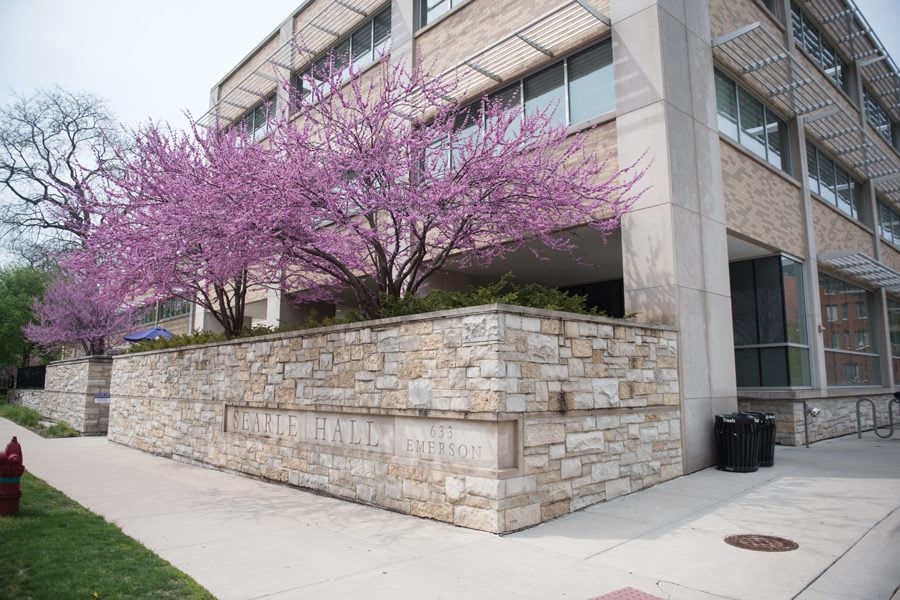As part of Sexual Assault Awareness Month, Callisto executive director Amanda Stewart speaks on using technology to support survivors
Searle Hall. The event was part of CARE and SPEAK for Change’s programming for Sexual Assault Awareness Month.
April 14, 2022
Content Warning: This article contains mentions of sexual misconduct, specifically sexual assault.
Callisto’s Executive Director and Director of Development Amanda Stewart spoke at Northwestern Wednesday as part of programming for Sexual Assault Awareness Month.
“Sometimes things in life aren’t fair, and they may not have been fair for me,” Stewart said. “But I can make them fair for other people. And I can do everything I can to advocate for other survivors so that they can have agency and autonomy and make their own choices.”
Callisto is a nonprofit that uses technology to provide a variety of services to college student survivors to help them on their journeys toward healing and justice. Stewart also announced Callisto’s launch on NU’s campus, and students can now access its variety of services at no cost.
Stewart’s talk centered on supporting survivors through digital storytelling and combatting sexual assault. NU’s Center for Awareness, Response & Education and SPEAK for Change partnered to host the event. SESP freshman Lynn Ahn moderated the discussion.
Stewart said she joined Callisto in April 2021 after a decade of working with nonprofits. Her experience as a college sexual assault survivor adds to her passion for the organization’s mission, she said.
“I was a college student who had to navigate the process, and I wasn’t aware of what was available to me,” Stewart said. “I understand how difficult the process can be from moving from a victim to moving into your journey toward healing and justice.”
Stewart said one of the greatest challenges survivors face is having to reshare their experiences because it can be challenging to repeatedly think about and recount traumatic occurrences. Callisto’s platform provides a space for people to compile their thoughts in one space, which can be very helpful, she added. The nonprofit also provides resources to survivors and their friends.
One of Callisto’s biggest services is its match system, which Stewart said helps counter the isolated offense narrative. She said finding out a perpetrator is a repeat offender can be a validating experience for people who have been invalidated by those around them in the past. The system also matches across college campuses, and students can also report people who are not college students, like coaches or faculty members.
“The matching feature was developed out of a critical question for survivors, ‘Did this person hurt someone else?’” Callisto’s website reads. “When a survivor enters into Matching, we can help identify repeat perpetrators across our campus network whether on- or off-campus. This supports community safety by potentially stopping a repeat perpetrator from harming others.”
Stewart said about 90% of sexual assaults committed on college campuses are done by repeat offenders. Callisto focuses on college students because young women are four times more likely to be assaulted on campuses than they are in the rest of their day-to-day lives.
By stopping regular perpetrators on their second offense, 59% of sexual assaults on college campuses could be prevented, Stewart said.
Some students in the audience then brought up security concerns and asked how Callisto will protect internal data.
“One (of the concerns) survivors have when sharing stories virtually or online is around safety,” Ahn said. “Whether it’s from the person who harmed them or for widespread targeted harassment.”
Callisto is not a reporting service, Stewart said in response, which is important because it gives power to the survivor to make the decision that is best for them. The information users log is encrypted and secured to make sure data stays anonymous, she said.
CARE’s next programming for Sexual Assault Awareness Month will feature Dr. Jennifer Lincoln, who will speak about her story of her Catholic high school sex education and ending vaginal shame on April 19.
Email: joannahou2025@u.northwestern.edu
Twitter: @joannah_11
Related Stories:
— Community members honor Ukrainians lost in conflict with Russia through candlelight vigil



